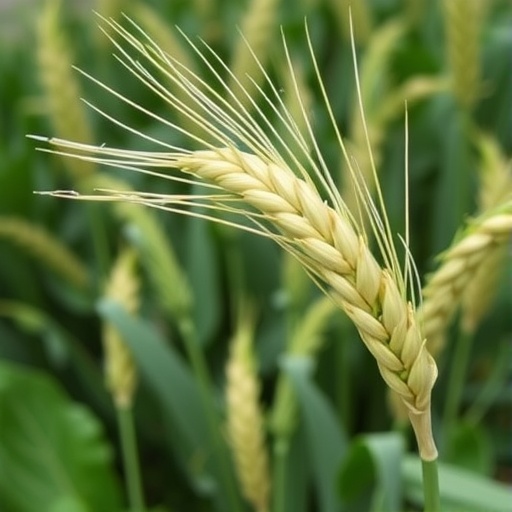In a groundbreaking study published in BMC Genomics, a pioneering team of researchers led by Domínguez-Rondón and colleagues has unveiled a cutting-edge strategy to enhance wheat resistance against the pernicious Septoria tritici blotch (STB), a disease that significantly threatens global wheat production. As food security remains a pivotal issue worldwide, innovative approaches to crop protection are critical. By integrating the latest advancements in host-pathogen interaction genomics, the study proposes a comprehensive framework aimed at fortifying wheat against STB, showcasing the transformative potential of genomic technologies in agriculture.
The research highlights the urgent need to address the challenges posed by STB, a fungal disease caused by Mycosphaerella graminicola, which is notorious for its rapid evolution and ability to circumvent existing resistance mechanisms in wheat varieties. The implications of STB on crop yields are staggering, with estimates suggesting that it can reduce production by up to 30% in affected regions. Through an integrative approach, the authors have examined the complex interplay between wheat plant defenses and the pathogen’s strategies, providing critical insights into breeding more resilient wheat varieties.
Utilizing state-of-the-art genomic tools, the researchers explored the wheat genome’s defense pathways, shedding light on how specific genes and proteins interact with the pathogen’s effectors. Their meticulous analysis involved extensive genomic sequencing, bioinformatics, and functional validation, enabling the identification of key players in the wheat defense response. This detailed understanding is not merely academic; it serves as a foundation for developing new breeding strategies aimed at enhancing wheat’s innate resistance to STB.
Moreover, the authors emphasize the importance of genomics in accelerating the breeding process. Traditional methods of breeding for disease resistance can be time-consuming and labor-intensive. However, with the integration of genomic data, breeders can pinpoint beneficial traits more efficiently and select candidates with greater precision. This leap in technology could significantly reduce the time required to develop resilient wheat varieties that can withstand the pressures of STB and contribute to sustainable agriculture.
Central to the research is the concept of “assisted gene editing,” a technique that allows for the precise modification of wheat genes linked to disease resistance. By leveraging the latest breakthroughs in CRISPR technology, the research team outlines a pathway for enhancing specific defense mechanisms within wheat. This cutting-edge approach has the potential to revolutionize crop management practices, offering a sustainable alternative to chemical fungicides that are currently employed to manage STB outbreaks.
The study also explores the environmental implications of enhancing wheat resistance through genomic interventions. With increasing concerns about the ecological impact of chemical treatments, developing genetically resilient crops could offer a dual benefit: maintaining yields while minimizing harmful environmental effects. This research aligns with global sustainability goals, reinforcing the need for modern agricultural practices that harmonize food production and environmental stewardship.
Crucially, the findings of this research extend beyond just wheat. The innovative methodologies and insights gained from studying the wheat-STB interaction could inform research on other crops facing similar challenges from pathogens. It exemplifies the potential for cross-species applications of genomic technologies, paving the way for a more resilient agricultural landscape across various crops threatened by emerging diseases.
The collaborative nature of the study signifies the importance of interdisciplinary efforts in tackling agricultural challenges. The convergence of genetics, pathobiology, and computational biology exemplifies how diverse scientific fields can unite to address complex issues in crop production. By fostering collaboration among scientists, breeders, and agricultural stakeholders, this research serves as a model for future endeavors aimed at safeguarding global food supplies.
As the world grapples with the pressing need for increased food production due to a growing population and climate change, the integration of genomics into agricultural research emerges as a beacon of hope. The transformative potential illustrated in this study underscores the urgency for continued investment in biotechnological research, particularly in the realm of crop improvement. The path forward lies in harnessing these advancements to create a more sustainable and food-secure future.
In conclusion, the work of Domínguez-Rondón and colleagues heralds a new era in wheat pathology and resistance breeding. By weaving together host-pathogen genomics with practical breeding approaches, this research could revolutionize how we understand and combat STB in wheat. The implications of this study may very well extend beyond the laboratory, influencing the practices of farmers worldwide and paving the way towards resilient, sustainable agricultural systems. As the findings are disseminated, the scientific community eagerly anticipates the further developments that will emerge from these pioneering insights, which promise to empower future generations of food producers in the face of evolving agricultural challenges.
This research not only offers novel insights into the genetic underpinnings of plant defense mechanisms but also provides a pragmatic framework for implementing these findings in real-world applications. With rising global grain demand, the focus on developing robust agricultural practices through science and technology will remain imperative to ensure food availability for all. The world watches closely as these innovations unfold, affirming the crucial role of genomic research in shaping the future of agriculture.
Subject of Research: Host-pathogen interaction genomics in wheat defense against Septoria tritici blotch
Article Title: Integrating host–pathogen interaction genomics to boost wheat defense against septoria tritici blotch.
Article References:
Domínguez-Rondón, A., Tirado, R., Solís, I. et al. Integrating host–pathogen interaction genomics to boost wheat defense against septoria tritici blotch.
BMC Genomics (2025). https://doi.org/10.1186/s12864-025-12174-9
Image Credits: AI Generated
DOI: 10.1186/s12864-025-12174-9
Keywords: wheat, Septoria tritici blotch, host-pathogen interaction, genomics, disease resistance, CRISPR, sustainable agriculture, food security, biotechnology, crop breeding.




